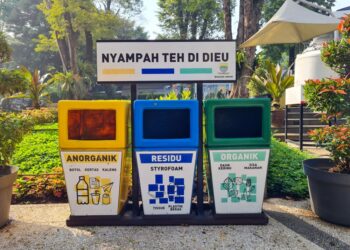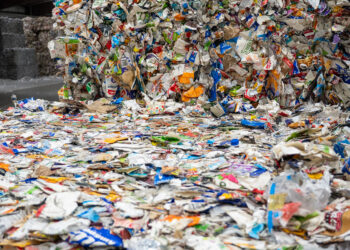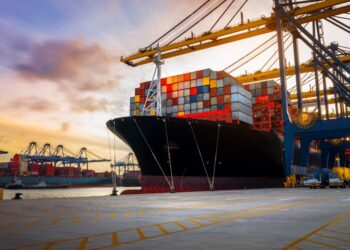U.S. President Donald Trump was set to implement 25% tariffs on Canada and Mexico, effective Feb. 4, then delayed them, creating a rapidly changing trade landscape that furthered uncertainty in the plastics recycling industry.
Trump said the tariffs, which include an additional 10% on Chinese imports, were intended to address immigration and drug issues he blames on the three countries. Oil and natural gas imports from Canada would have been subject to a lower 10% tariff, according to a White House fact sheet.
He also has threatened tariffs against the European Union, based on what he perceives as poor treatment of the U.S.
On Feb. 3, Mexico said it agreed to send troops to the U.S. border, which will delay tariffs on the country for a month. Later in the day, Prime Minister Justin Trudeau announced that the retaliatory tariffs would also be paused for 30 days after Canada agreed to implement a nearly $1 billion border plan.
That price tag includes sending new helicopters, technology and personnel to the border and appointing a “fentanyl czar.” Cartels will be classified as terrorists and a Canada-U.S. Joint Strike Force will be created to combat organized crime, fentanyl and money laundering.
Initially, Canada had announced retaliatory 25% tariffs on $30 billion in U.S. goods including pulp, paper and plastic resins, effective Feb. 4. The country also intended to impose tariffs on an additional $125 billion in goods including vehicles, steel and aluminum products, produce, beef and pork, dairy and recreational boats, following a 21-day public comment period.
What’s at stake
In 2024, Canada and Mexico combined to receive about 56% of all U.S. plastic scrap exports in 2024. Nearly 60% of U.S. PET scrap plastic exports went to Mexico, and 26% of PE scrap exports went to Canada. The only country receiving more U.S. PE scrap was India. PET and PE scrap accounted for just over half of all U.S. plastic scrap exports throughout the year.
Mexico and Canada combine to provide about 30% of U.S. bottle-grade and film-grade PET resin imported into the U.S., according to data from the U.S. International Trade Commission. The U.S. doesn’t have a tariff code for RPET, so any imported volumes would be included in virgin PET totals.
Because of existing tariffs on Chinese PET, the country imports only nominal amounts into the U.S. – about 2,500 metric tons in 2023 and around 100 metric tons in 2024.
Inexpensive virgin HDPE as a result of vast global oversupply has suppressed demand for RHDPE in recent years, as massive new PE plants have started up in the U.S. and in China.
Numerous companies and industry associations commented on the tariffs, both before and after they were formally announced, largely hoping for a swift resolution of the dispute and highlighting the industry’s significant role in a robust economy.
Industry response
Many industry statements touched on the United States-Mexico-Canada Agreement, which was created during the first Trump administration to replace the North American Free Trade Agreement.
“While we understand the Trump Administration must focus on solutions to address major problems at the border, such as fentanyl trafficking, the imposition of tariffs on our North American trading partners will significantly disrupt U.S. manufacturing and recycling operations that depend on recycled material inputs,” Robin Wiener, president of the Recycled Materials Association, said in a written statement.
Wiener added: “The U.S. recycled materials industry is a net exporter and supports 500,000 jobs nationwide, with the exports of recyclables helping to reduce the U.S. trade deficit. U.S. recyclers benefit greatly from the North American market access that the USMCA provides, access that these tariffs will put at risk.”
The tariffs are separate from Trump’s directive to his incoming cabinet to review existing trade and tariff policies on imports including steel and aluminum, Chinese shredder wear parts and the USMCA, ReMA said in a separate statement. That review is due April 1.
Each year, more than $8 billion in recycled materials cross the U.S.-Canada border and nearly $3.3 billion of recycled products cross the U.S.-Mexico border, Wiener said. “These new tariffs, and any retaliatory measures they may provoke, will only reduce the competitiveness of our industry and the manufacturers that rely on recycled materials,” she added.
CEO Matt Seaholm of the Plastics Industry Association said the organization is concerned about the new tariffs and their impact on U.S. plastics manufacturing and jobs.
“While we understand President Trump’s rationale, a blanket tariff policy could have significant economic consequences, disrupting the movement of essential machines, products, and materials that keep American manufacturers running,” he said in a written statement, adding that new tariffs on key trading partners threaten supply chains, increase costs and risk eroding the U.S. trade surplus for plastics.
“Canada and Mexico are our industry’s largest trading partners. The American chemical industry imports materials, many of which are unavailable in the United States, adding value and supporting other manufacturing supply chains domestically and abroad, through our exports,” said the American Chemistry Council in a statement. The ACC added that U.S. chemicals hold a net exporter position with Canada and Mexico.
The ACC continued: “We would ask that all parties negotiate a solution to the issues behind these Orders as soon as possible. In particular, the U.S. chemical industry continues to support the USMCA Agreement between the United States, Canada and Mexico.” The American Fuel & Petrochemical Manufacturers trade association and the National Association of Manufacturers made similar statements.
Several corporations with significant investment in recycling also addressed the potential tariff impacts in earnings calls, most of them just days before they were announced.
In Amcor‘s earnings call Feb. 4, CEO Peter Konieczny added that although the company’s business tends to be localized and doesn’t rely on imported goods, the structure of some customer agreements would allow the company to pass through any tariff-related costs. “We feel we are not immune, but somewhat robust against the tariffs.”
Eastman CEO Mark Costa said in a Jan. 31 earnings call that today’s global manufacturing economy is weaker than during the 2019 trade war with China and many countries are in a weaker position. “So it’s not clear to me how much more negative impact tariffs can have on top of the manufacturing recession we’re already in.”
He added that “our forecast does not include any significant impact from the trade actions.”
During a Dow earnings call Jan. 30, Chief Financial Officer Jeffrey Tate said the company was watching for any impact from ongoing geopolitical volatility, including potential tariffs.
Dow has PE production in Canada’s Alberta province and is building a “net-zero” ethane cracker to produce ethylene feedstock for its polymers. In the U.S. it has invested in mechanical recycling.
Canada has nearly 5 million metric tons per year of virgin PE capacity, according to Argus Media, and shipped 2.9 million metric tons to the U.S. between January and November 2024, or 86% of all PE imports, according to U.S. International Trade Commission data. Full-year data will be available Feb. 5.
Dow is “relatively balanced with Canada,” CEO Jim Fitterling said during the call, though he acknowledged there was “a little bit more coming into the U.S. from a finished product standpoint, but we have product that moves both ways.” He added, “I don’t think it’s the administration’s view to do something that’s going to hurt the global economy. I think they want to try to create the situation where we continue to have growth and investment here.”
ExxonMobil CEO Darren Woods said Jan. 31, “At the end of the day, what we can control is how effective and efficient we are as operators, making sure that we’re producing the highest value products for the kit that we have and efficiently getting it to market.” ExxonMobil is investing in new chemical and mechanical recycling capacity in the U.S.
He added that tariffs would not change that stance, “and our view is we’re going to continue to be a very cost-competitive, low-cost-to-supply source, and therefore we’ll continue to outperform competition, and that’s basically how we’re looking at it as we kind of wade through the noise that’s out there in the media and the press with respect to all the speculation around policy.”





























